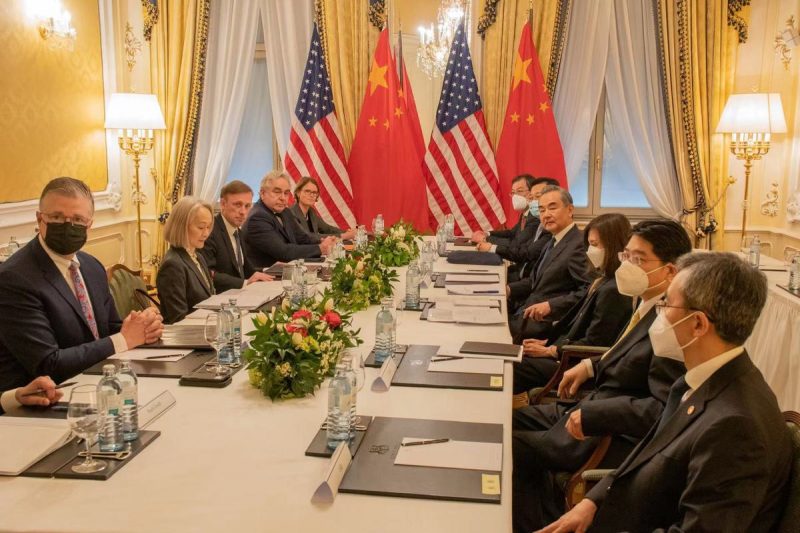Beijing has warned the US it will “resolutely object” any move by Washington to restrict US companies from investing in China – or coercing its allies to follow suit.
China’s concerns are believed to have been raised in at least one of two high-level meetings with senior US officials this week.
US ambassador to China Nicholas Burns met with China’s Minister of Commerce Wang Wentao to discuss economic and trade issues, the China Daily said.
On Thursday, the Commerce Ministry gave a sharp response to a report that President Joe Biden aims to sign an executive order to limit investment in China’s high-tech industries – and hoped to get endorsement from its G7 partners on such curbs.
“If the news report turns out to be true, China will resolutely object to such acts”, ministry spokeswoman Shu Jueting said.
She said such a move would run contrary to the market economy and the principle of fair competition, affect enterprises’ normal business decisions, undermine the international economic and trade order and disrupt global supply chains.
ALSO SEE:
G7 Nations Planning Ways to Counter China ‘Coercion’: Yellen
Sullivan meets Wang Yi in Vienna
Meanwhile, White House national security adviser Jake Sullivan met China’s top diplomat Wang Yi for secret talks in Vienna on Wednesday and Thursday, officials from both sides said on Thursday (US time).
These talks, which were not announced in advance, appeared to go much better and last much longer than previous bilateral meetings.
The White House hoped the eight hours of talks in Vienna between Sullivan and Wang Yi, plus other senior officials from both sides, would pave the way for more communications between the world’s two biggest economies, a senior US official said on Thursday.
Both sides recognised the need to move beyond the ‘spy balloon’ incident that disrupted relations between the superpowers, the official said.
The China Daily said the two sides had “candid, in-depth, substantive and constructive discussions on bilateral ties”, adding that the were aimed at “removing obstacles in China-US relations and stabilising the relationship from deterioration”.
Move to repair ties
The US official, who briefed reporters on condition of anonymity, said Sullivan and Wang did not discuss dates for a possible rescheduled visit to Beijing by Secretary of State Antony Blinken, but said the White House expects the two sides to continue engaging in coming months.
Biden has been seeking to hold a phone call with Chinese President Xi Jinping but the official had no update on that idea.
Blinken cancelled a planned trip to Beijing in February after the US shot down the Chinese balloon that flew over sensitive military sites, plunging the rivals into a diplomatic crisis.
Asked what was discussed about the incident, the official replied: “I think both sides recognized that that unfortunate incident led to a bit of a pause in engagement. We’re seeking now to get beyond that, and reestablish some just standard, normal channel of communications.”
The official said the US side had made clear where it stood on the breach-of-sovereignty issue, but was “trying to look forward from here on” and seek issues where China and the US could potentially work together.
US-China ties have been on a downward slide over issues ranging from accusations of Chinese spying and human rights abuses to US efforts to build up military alliances to curb China’s ambitions toward Taiwan and in the Pacific.
Keeping communication channels open
The official said both sides agreed to maintain the channel of communication between Sullivan and Wang and that Sullivan had stressed that Washington did not seek conflict or confrontation.
Sullivan raised concerns about American citizens detained in China and stressed that this was a personal priority of Biden. He also raised concerns about the potential for Chinese military assistance to Russia in Ukraine.
A White House statement earlier said the talks sought to build on Biden and Xi’s meeting in Indonesia in November.
The Vienna meeting came ahead of an expected visit to Asia by Biden starting with a G7 summit in Japan from May 19-21 that is expected to look for closer alignment of the group’s approach towards China.
Blinken’s cancelled trip had been intended to help repair relations after an earlier rupture over a visit by then-House Speaker Nancy Pelosi’s to Taiwan, the self-governed island that China considers its own.
The United States has expressed its eagerness to reschedule Blinken’s visit and arrange other senior-level meetings as part of an effort to keep relations from veering toward conflict.
Blinken did meet Wang Yi at the Munich Security Conference after the balloon incident, but this did not soothe tensions.
Daniel Russel, the top US diplomat for East Asia in the Obama administration, said communication between the US national security adviser and the top Chinese foreign affairs official has been historically important and today “appears to be virtually the only significant channel still operating.”
He said the avoidance of damaging public sparring seen in the past was encouraging, but did not mean relations were necessarily on the mend.
“Both sides are delivering stern – sometimes angry – messages,” he said, “but these meetings create the possibility they may find some common ground that can help stabilise a relationship that is dangerously volatile.”
- Jim Pollard with Reuters
ALSO SEE:
Taiwan Invasion ‘Could Wipe Off up to $1 Trillion Per Year’
Chinese Firm in Talks to Sell Military Drones to Russia: Report
China Raids Office of US Due Diligence Firm, Detains Staff
US ‘Discussing Possible China Sanctions’ With Allies Over Ukraine
US Warns China Will Face ‘Real Costs’ for Lethal Aid to Russia
Six Chinese firms blacklisted over ‘spy balloons’
























